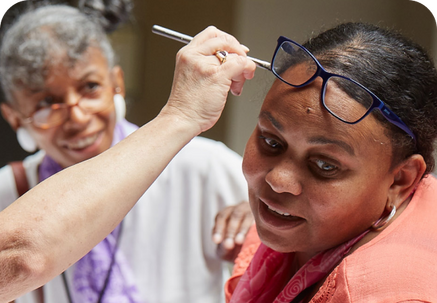GLP-1 Agonists May Modulate Treatment Efficacy in Central Centrifugal Cicatricial Alopecia
Central centrifugal cicatricial alopecia (CCCA) is a scarring hair loss disorder that ...
The Scarring Alopecia Foundation is the world's only patient advocacy organization exclusively dedicated to advancing research, supporting patients, and providing education for scarring alopecia.






Support Scarring Alopecia Foundation this month for National Scarring Alopecia Awareness Month.
We have a month full of webinars, activations, and launches you won't want to miss.
This year's theme is Turning Action Into Awareness.
Follow our social pages and sign up for our email lists for more information.

For the low cost of $99, you can purchase our Conference Video Bundle. These videos are from our Saturday sessions where we heard presentations from Dr. Jerry Shapiro and Dr. Maria Hordinsky, and two of our panels - Ask The Doctors with Dr. Maryanne Senna, Dr. Benjamin Unger, Dr. Maria Hordinsky, and Dr. Jerry Shapiro and Ask The Patients with members of our scarring alopecia community.
For those who attended the conference, please email ml@scarringalopecia.org for your conference link.

A Letter from our Executive Director: A Major Milestone in the Care of Scarring Alopecia. The Centers for Disease Control and Prevention (CDC) has approved the ICD-10-CM codes for Central Centrifugal Cicatricial Alopecia (CCCA) and Frontal Fibrosing Alopecia (FFA), which will go into effect in October 2024. The codes, L66.81 and L66.12, are the first of its kind and the result of tireless advocacy from patients, dedicated healthcare providers, and strong support from professional dermatologic societies and organizations.
Alopecia mucinosa, also known as follicular mucinosis, is a rare inflammatory condition in which a jelly-like substance (mucin) builds up and deposits around hair roots, resulting in degeneration of the follicles.
Central Centrifugal Cicatricial Alopecia (CCCA) is part of a group of disorders known as cicatricial or scarring alopecias, which destroy hair follicles, replace them with scar tissue, and cause permanent hair loss.
Classic Pseudopelade (Brocq) is a rare type of scarring hair loss, meaning that the hair loss in affected areas is permanent.
Dissecting cellulitis is a rare and long-lasting condition that affects the hair follicles on the scalp. It's also called dissecting folliculitis or perifolliculitis capitis abscedens et suffodiens.
Discoid Lupus Erythematosus (DLE) is a type of chronic cutaneous lupus erythematosus, an autoimmune disorder that primarily affects the skin and hair follicles.
Erosive pustular dermatosis (EPD) of the scalp can lead to scarring alopecia. This condition causes chronic inflammation, which can damage hair follicles and result in permanent hair loss and scarring in the affected areas.
Folliculitis decalvans belongs to a group of disorders called cicatricial or scarring alopecias that destroy the hair follicle, replace it with scar tissue, and eventually causes permanent hair loss.
Frontal Fibrosing Alopecia (FFA) is an inflammatory skin disorder with progressive hair loss (alopecia) due to the destruction of hair follicles. The hair loss is centered around the eyebrows and front hairline and can be permanent or scarring in nature.
Folliculitis Keloidalis, also known as Acne Keloidalis Nuchae (AKN), is a chronic inflammatory condition that primarily affects the hair follicles on the nape of the neck and the occipital scalp.
Graham-Little Syndrome, also known as Graham-Little-Piccardi-Lassueur Syndrome, is a rare type of scarring alopecia that primarily affects women, which results in permanent hair loss in affected areas of the scalp due to the destruction of hair follicles and replacement by scar tissue.
Keratosis Follicularis Spinulosa Decalvans (KFSD) is a rare genetic disorder that primarily affects the skin and hair. It is characterized by the development of small, spiny papules due to the plugging of hair follicles with keratin, leading to progressive hair loss, particularly on the scalp, where it results in scarring alopecia.
Lichen planopilaris (LPP) is a form of alopecia (hair loss) which can be cicatricial (scarring) and permanent in nature. While the cause is unknown, it is likely a primary inflammatory process induced by genetic and/or environmental factors, rather than secondary to infections, burns, surgical scars, caustic hair products, etc.
Select an existing meeting from the sidebar, or create a new one by navigating to the Meetings tool
Central centrifugal cicatricial alopecia (CCCA) is a scarring hair loss disorder that ...
Want to receive e-news updates and alerts about the latest medical updates, research, information, events and more?